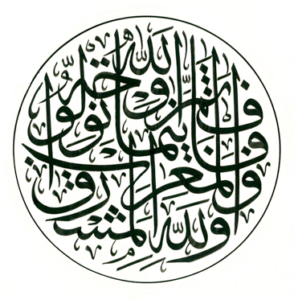It is commonly known that Muslims, for the most part, shun images of their prophet. They certainly do not approve of images of God, though Islám is perhaps as stained by idolatry as any religion. Muslims worship the Qurán as an uncreated being (the word of God exists before creation), they revere Muhammad as the perfect man, and they circumambulate a black stone in what is perhaps their foremost expression of worship. In addition to all that, the Qur’án itself reduces the will of God to a very specific image that can stifle the imagination.
But when it comes to the actual Face of God, the Qur’án anthropomorphizes God in a rather non-idolatrous way which I find quite inspired (“your mileage may vary”). It arises in the way that the Qur’án speaks of “the Face of God.” The Qur’án makes reference to this specific construct only twice. In one passage, the point is made that the Face of God can been seen everywhere, and presumably, in everything:
To God belong the East and the West; whithersoever you turn, there is the Face of God; God is All-embracing, All-knowing. [2:115]
Taken in this manner, the Qur’án makes the iconoclastic assertion that no one thing is really any more sacred than anything else.
In another passage, the Qur’án asserts that the primary moral motivation of Muslims ought to be “the Face of God:”
… they give food, for the love of Him, to the needy, the orphan, the captive: “We feed you only for the Face of God; we desire no recompense from you, no thankfulness; for we fear from our Lord a frowning day, …” [76:8-10]
In this passage, the usage is at first anthropomorphic. It is curious that Arberry’s English translation uses the word “frowning” to describe a day. The Arabic word here is ‘abús, which is generally taken to mean “harsh,” but the root verb for ‘abús is ‘abasa, which means “to frown.” The name ‘Abbas also derives from this verb. Thus a bad day can be described as a frowning day, or perhaps even a frown on the Face of God. Rather poetic!
Another key passage in which the Qur’án describes God can be found in the Sura of the Light (An-núr) wherein we read:
God is the Light of the heavens and the earth; the likeness of His Light is as a niche wherein is a lamp (the lamp in a glass, the glass as it were a glittering star) kindled from a Blessed Tree, an olive that is neither of the East nor of the West whose oil wellnigh would shine, even if no fire touched it; Light upon Light; (God guides to His Light whom He will.) (And God strikes similitudes for men, and God has knowledge of everything.) [24:35]
A curious poetic twist to this passage is given by the fact that in Arabic, light (núr) and fire (nár) share a common root and are quite similarly sounding words.
Here we see a nearly recursive depiction of the divine. In a sense, God is a niche which gives light, but if one looks closer one sees that God is a lamp in that niche. Yet if one looks closer still, one sees that God is the fire, or closer yet, one discerns that God is the oil that stores the fire within it; or is God the tree that made the oil? Thus the nature of God is no simple matter, even something of a puzzle.
Note: Chronologically, the three passages in this post come from the late suras of the Qur’an, known as the Medina suras. They are all among the earlier suras (first 16) of the Medina group.
©2017 Kaweah (Dan Jensen)


Nicely done, Dan — I grow more impressed reading your posts!
These concepts of God strike me as pantheistic. God knows all because God is all. And — everything is code. That explains how the Word can exist before creation — God needed to code it up!